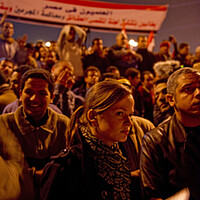One Gaza family's dinner in a brief moment without war
Loading...
| Gaza City, Gaza Strip
For the first time all day, there was quiet in this small apartment as five families crowded around a meal of chicken, rice, and yogurt, silently waiting for the call to prayer that marked the end of the day's fast.
As the sound wafted through the open windows, 28 people reached for cups or platters. Ramadan is usually a time when families gather to break the fast together. But this is unusual even for Ramadan: 28 people, all extended family members, in one place. And they're not just eating but sleeping here as well after one small family of five opened its home to relatives fleeing the conflict.
The number of Palestinians killed in the Israeli assault on Gaza has now surpassed 900, with nearly 6,000 wounded, according to the Gaza Ministry of Health. But the conflict has also affected the lives of nearly everyone else in Gaza. Families who have not lost anyone huddle in the kitchen at night, praying that tonight won't be the night. Businessmen have shuttered their shops, and children have grown restless from weeks of being kept inside. And while more than 160,000 people have taken shelter in UN-run schools after leaving their homes, an unknown but undoubtedly huge number have also sought refuge with their family members. Gaza is now full of unofficial shelters for displaced people.
As a 12-hour humanitarian truce between Israel and Hamas takes hold today, many of these families are relieved at the prospect of one day without hearing the thud of airstrikes and calling family members to make sure they're still alive. Most are hoping for a longer cease-fire that ends the war, and they're also praying for an agreement that lifts the Israeli blockade on Gaza and ends the isolation and deprivation of Gaza that has touched their lives in countless ways.
“We have lost everything,” says Ali al-Athamna, one of those crowded into the small apartment for iftar. “We have big homes and fields in Beit Hanoun. Now we are considered as refugees. No one can protect us, because we are not Israelis, we are Palestinian.”
All of the families in this apartment fled from Beit Hanoun, on the northeastern edge of Gaza that has seen intense conflict since Israel launched its ground operation more than a week ago. Mr. Athamna's wife, Mayar Nasser, who has three daughters and is pregnant, says they have no idea when they will be able to return home. But she feels safer here, surrounded by so many people, where family members bump into each other in the hallway, the bathroom is always full, and the apartment is always loud.
At the mosque
Earlier, on Friday afternoon in Gaza City, men crowded into a mosque for Friday prayers. It would have looked almost normal if not for the deep, rumbling thuds of airstrikes and shelling coming ever closer. Huge lines formed outside banks as people tried to withdraw their salaries from automatic teller machines. Markets and sweets shops, which would normally be bustling in the afternoon during Ramadan, did slow business.
At the Arafat Brothers shop for traditional sweets, owner Youssef Arafat said he only opened the shop for a few hours in the afternoon because it was beside his home. Some of his branches were destroyed in the conflict, and he keeps all the others closed. Large round pans of sweets sat waiting for customers in the empty shop. He said his business is 10 percent of what it usually is in Ramadan.
Regardless of what happens in the coming days, he says, he is not optimistic. “There is no hope,” he says. “Because the biggest problem is when the war comes to an end. Where are these 300,000 people going to go?” he asked, referring to those who lost their homes. “Zeitoun, Shejaiya, Khuzaa – so many places have been destroyed.”
At a nearby restaurant for grilled meat, a manager said the only business they were doing was for charities distributing food to displaced people.
Every corner filled with people
Back at the small apartment in Gaza City, children played and wailed as adults discussed the war and women washed dishes from the meal. The apartment has only two bedrooms and one bathroom. The families have moved some of the furniture into a outer corridor to make room for more people to sit on cushions on the floor. They sleep everywhere – the bedrooms, the family room, even the kitchen.
They were lucky to have both electricity and running water – both scarce in Gaza these days – during the meal. Dozens of mobile phones are plugged in with extension cords.
Then the electricity cuts off. A huge roar suddenly comes from outside, and people lunge away from the windows, spilling tea, as a light fills the sky. Then they laugh at their terror as they realize it was a rocket launched toward Israel, not an explosion nearby. Still, a toddler sits huddled next to her grandmother, covering her ears.
“Every bomb we hear, we think it's going to land on us,” says Liza Nasser, a university student who normally lives in this apartment with just her parents and two siblings. “Every time we hear someone died, we say maybe we are next.”
The family spends the day listening to news and bombings, and calling friends and family. At night, they try to sleep amid the shelling.
Ms. Nasser recently had to forgo a scholarship to study English in the United States for a year when she couldn't leave Gaza due to Israel's and Egypt's travel restrictions. She longs to travel, and hopes for the day when the blockade on Gaza is lifted.
But for now, she is not hopeful that will happen imminently. “From the news we hear, we don't think this will get better,” she says.





